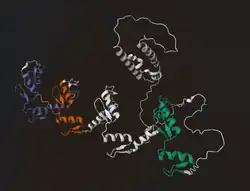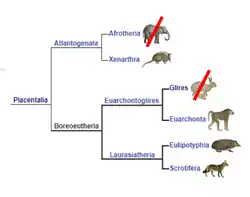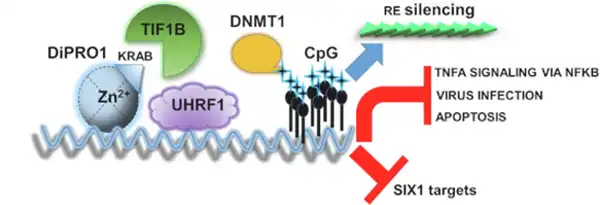ZNF555
| ZNF555 | |||||||||||||||||||||||||||||||||||||||||||||||||||
|---|---|---|---|---|---|---|---|---|---|---|---|---|---|---|---|---|---|---|---|---|---|---|---|---|---|---|---|---|---|---|---|---|---|---|---|---|---|---|---|---|---|---|---|---|---|---|---|---|---|---|---|
| Identifiers | |||||||||||||||||||||||||||||||||||||||||||||||||||
| Aliases | ZNF555, zinc finger protein 555 | ||||||||||||||||||||||||||||||||||||||||||||||||||
| External IDs | HomoloGene: 65060; GeneCards: ZNF555; OMA:ZNF555 - orthologs | ||||||||||||||||||||||||||||||||||||||||||||||||||
| |||||||||||||||||||||||||||||||||||||||||||||||||||
| |||||||||||||||||||||||||||||||||||||||||||||||||||
| |||||||||||||||||||||||||||||||||||||||||||||||||||
| |||||||||||||||||||||||||||||||||||||||||||||||||||
| Wikidata | |||||||||||||||||||||||||||||||||||||||||||||||||||
| |||||||||||||||||||||||||||||||||||||||||||||||||||
Zinc finger protein 555 (ZNF555) protein encoded by the ZNF555 gene.[3] It is located on the short arm (19p13.3 )[4] of the human chromosome 19 (hg38) at position chr19:2,841,573-2,853,952, spanning 12,380 base pairs.[5] It contains four coding exons.
It belongs to the Krüppel associated box (KRAB) C2H2 zinc-finger family and is predicted to act as a sequence-specific transcriptional regulator. Experimental work in human myoblasts suggests that ZNF555 can bind a 4qA-subtelomeric enhancer and modulate expression of the mitochondrial ADP/ATP translocase gene SLC25A4 (ANT1), implicating it in mechanisms proposed for facioscapulohumeral muscular dystrophy (FSHD).[6]
Nomenclature
ZNF555 is also known by the synonym DiPRO1 (Death, Differentiation, and PROliferation-related PROtein 1), which was recently assigned based on newly discovered functions.[7]

[ZNF555 Protein Structure.png]
Structure
The ZNF555 protein (Q8NEP9 · ZN555_HUMAN) is composed of 628 amino acids with a molecular weight of approximately 73.1 kDa.[8] The protein contains one KRAB A-box domain and fifteen C2H2-type zinc finger domain.
Two additional isoforms are predicted:
- Q8NEP9-2[8], which consists of 543 amino acids and differs from the full-length isoform by lacking three zinc finger domains
- Q8NEP9-4[8], which has 627 amino acids and differs from the full-length isoform by a single amino acid.

Evolution and species distribution
Phylogenetic analysis suggests that the ZNF555 gene is conserved within placental mammals and may represent a relatively recent evolutionary development.[7] Comparative genomic studies indicate a statistically significant expansion of the gene in pigs, American black bears, and ferrets, with these species possessing two copies of ZNF555. The gene is absent from most rodents, rabbits, and elephants, with the naked mole rat as an exception. This absence suggests that these common laboratory animal models may be unsuitable for research on ZNF555.
Function
ZNF555 belongs to the KRAB (Kruppel-associated box) zinc finger protein (KRAB-ZFPs) family,[9], which is involved in DNA and protein binding as well as transcriptional regulation. Although its precise biological function remains incompletely characterized, ZNF555 has been implicated in the epigenetic silencing of retrotransposable elements (REs),[9] as well as in muscle cell differentiation and proliferation[7]. Depending on its interacting protein partners, ZNF555 may act either as a transcriptional activator or repressor. Additionally, it may play a role in the regulation of CpG island methylation.[7]

[[1]]
Interactions
ZNF555/DiPRO1has been shown to interact with TIF1B/KAP1, UHRF1 and MCM protein complex.[7] ZNF555 protein shares certain DNA-binding regions with SIX1, a transcription factor regulating myogenesis, and ZSCAN4, a zinc finger protein implicated in genomic stability.[7]
Clinical significance
ZNF555 has been associated with Facioscapulohumeral Muscular Dystrophy (FSHD).[6] Additionally, ZNF555 has been linked to mesenchymal cancers, including rhabdomyosarcoma and Ewing sarcoma, where it is suggested to function as an inhibitor of cancer cell death.[7]
See also
- Zinc finger
- Transcription factor
- Chromosome 19
- CpG island
- Rhabdomyosarcoma
- Ewing sarcoma
- FSHD dystrophy
References
- ^ a b c GRCh38: Ensembl release 89: ENSG00000186300 – Ensembl, May 2017
- ^ "Human PubMed Reference:". National Center for Biotechnology Information, U.S. National Library of Medicine.
- ^ "Homo sapiens zinc finger protein 555 (ZNF555), transcript variant 1, mRNA". NIH. 2025-04-27.
- ^ "Gene symbol report | HUGO Gene Nomenclature Committee". www.genenames.org. Retrieved 2025-08-11.
- ^ "Human Gene ZNF555 (ENST00000334241.9) from GENCODE V48". genome-euro.ucsc.edu. Retrieved 2025-08-11.
- ^ a b Kim E, Rich J, Karoutas A, Tarlykov P, Cochet E, Malysheva D, et al. (2015-09-30). "ZNF555 protein binds to transcriptional activator site of 4qA allele and ANT1: potential implication in Facioscapulohumeral dystrophy". Nucleic Acids Research. 43 (17): 8227–8242. doi:10.1093/nar/gkv721. ISSN 0305-1048. PMC 4787827. PMID 26184877.
- ^ a b c d e f g Rich J, Bennaroch M, Notel L, Patalakh P, Alberola J, Issa F, et al. (2024-07-15). "DiPRO1 distinctly reprograms muscle and mesenchymal cancer cells". EMBO Molecular Medicine. 16 (8): 1840–1885. doi:10.1038/s44321-024-00097-z. ISSN 1757-4684. PMC 11319797. PMID 39009887.
- ^ a b c "UniProt". UniProt. Retrieved 2025-08-11.
- ^ a b Ecco G, Imbeault M, Trono D (August 2017). "KRAB zinc finger proteins". Development. 144 (15). Cambridge, England: 2719–2729. doi:10.1242/dev.132605. ISSN 1477-9129. PMC 7117961. PMID 28765213.

